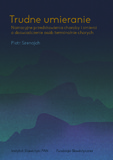Trudne umieranie
The difficulty of dying
Narrative representations of disease and death and the experience of terminally ill persons
Author(s): Piotr Szenajch
Subject(s): Anthropology, Social Sciences
Published by: Instytut Slawistyki Polskiej Akademii Nauk
Keywords: anthropology; metaphor; taboo; oncology; hospice; film; novel
Summary/Abstract: “The work consists of three parts, corresponding to consecutive phases of my study. The first part constitutes a multi-layered description of 20th-century narrative representations of disease and death. The second part is an analysis of a few currents in the public discourse of death that I find to be of essence, it also contains some interpretational efforts important for the entirety of the project. The third part is an account of conversations I had with patients of the Caritas Stationary Hospice of the Archdiocese of Warsaw in 2007. Each of the parts took on a separate character. They differ in the methodology of analysis, strategies of interpretation, and even, to some extent, in narrative style. Each part is also in some way a separate attempt to say something about dying in the contemporary world” (from the introduction). “The overflow of representations of death as a soothing culmination, of initiatives freeing us from the taboo of death, and of scholarly deliberations about death as a master key to the human condition – all this is dramatically at odds with the experience of dying as told by my interlocutors. All these cultural approaches to death did nothing to prepare them for the disorganisation of life, the physical and psychological suffering, the threat to the order of lives of others, and the deficiency of meaning that are associated with dying. An aestheticized and meaningful death is something one can talk about. The experience of dying is unalterably surrounded by a wall of silence and isolating practices” (from the introduction). “Piotr Szenajch’s work defies the commonplace thesis – a thesis derived from a superficial reading of Hans-Georg Gadamer – that the “truth” sought by the humanities is mutually exclusive with “method”. On the contrary, there is, as the author demonstrates, a certain method, a rigorous technology of the intellect, which following Barbara Fatyga and Przemysław Zieliński he calls the removal of metaphors. This method allows for bringing to order even as resistant a material as dying, to see in it seams and bastings, to look beneath the lining of silence. However, as Szenajch finds, nothing, no method in the world, can tell us how to understand the result we arrive at, how to face what we have wilfully stripped of metaphors. The author leads us to this conclusion through a winding road but it is a journey the reader will not have regretted” (Joanna Tokarska-Bakir).
- E-ISBN-13: 978-83-64031-31-1
- Print-ISBN-13: 978-83-64031-24-3
- Page Count: 360
- Publication Year: 2015
- Language: Polish
- eBook-PDF

